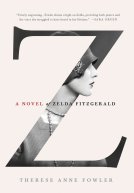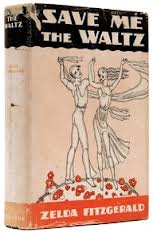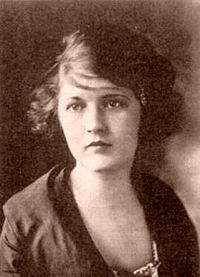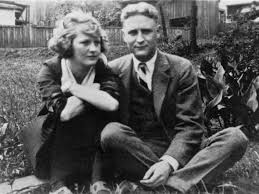Born with an exotic name that lent itself to bright lights and a spirit that loved nothing more than to dwell under them, it is not surprising that Zelda Sayre’s life was illuminated and became of interest to so many who were less daring themselves but fascinated with her life and antics.
But just as light cannot exist without shadow, she would discover the darker underside of a life lived in the shadow of her husband, when she dared to pursue her own desire to be recognised as a professional in her own right.
 Z: A Novel of Zelda is an excellent companion novel to The Paris Wife and one of an expanding collection that gathers around that group of artists, writers, wives and hangers-on of the “lost generation“, a term coined by a young French mechanic who was reprimanded for giving insufficient priority to repairs on Gertrude Stein’s Model T Ford and thus complained to his patron that they were all a “generation perdue“, those young people who served in the war, respected little and indulged themselves to immoderate excesses.
Z: A Novel of Zelda is an excellent companion novel to The Paris Wife and one of an expanding collection that gathers around that group of artists, writers, wives and hangers-on of the “lost generation“, a term coined by a young French mechanic who was reprimanded for giving insufficient priority to repairs on Gertrude Stein’s Model T Ford and thus complained to his patron that they were all a “generation perdue“, those young people who served in the war, respected little and indulged themselves to immoderate excesses.
Hemingway’s A Moveable Feast is a logical follow on read, having now read the fictionalised accounts of the two wives of these well-known writers and great friends who were in the midst of that post WWI group that sought a kind of writing utopia in Paris.
While the utopia may have eluded them, their experiences would provide rich material for their writing, even if at the expense of some of their friends and loved ones. It is interesting to note that while their output during those early years was largely even, the Hemingways‘ lived quite frugally with an awareness of their financial struggle, while the Fitzgeralds‘ lived hedonistically in complete denial of theirs.
Zelda was reluctant to be lured away from Montgomery, Alabama by a complete dreamer and in the early days of their courtship actually threatened to dump F.Scott Fitzgerald unless he proved himself worthy and obtained his first serious publishing contract.
“I was so sure of our love then, so determined to prove to Mama and Daddy that we weren’t doing things wrong, just differently. There was no way to know that certainty would one day become a luxury too.”
 When Fitzgerald succeeds in getting that commitment from his publisher to publish This Side of Paradise, she is ready to join him in New York and their life of adventure will begin.
When Fitzgerald succeeds in getting that commitment from his publisher to publish This Side of Paradise, she is ready to join him in New York and their life of adventure will begin.
From New York to Paris and the south of France, where Zelda throws herself into her own professional dance ambitions and is rewarded with an offer, which makes this reader wonder, what might have happened if…
“Scott and I both were awed by how cultured all these folks appeared to be, how intact they all were. For a change, Scott listened more than he talked. They spoke of painting and music and dance – their own work as well as other artists’ – with knowledge and candor and passion. If they felt rivalries, they expressed the situations as challenges, not jealousies.”
I came to this novel with no idea about Zelda or the role she played among the writing set of Paris and while much has been written in personal letters and hospital records documenting her mental health challenges and treatments, I find Therese Anne Fowler’s depiction of the character Zelda to be both realistic and sensitive and portrayed in a way that is compelling to read. It has made me interested to read more about Zelda Fitzgerald and that period in history she was a part of; she was one of, if not the first young women referred to as a “flapper” of the 1920’s, a kind of “it girl” whose rise in society came about alongside a public contempt for prohibition and was described by Dr. R. Murray-Leslie, who criticized
“the social butterfly type… the frivolous, scantily clad, jazzing flapper, irresponsible and undisciplined, to whom a dance, a new hat, or a man with a car, were of more importance than the fate of nations.” Times 5 Feb 1920, p 9
They were a significant step away from accepting the lives of their mothers before them and while they accepted the lesser role in support of their husbands and were not quite suffragettes, they developed an awareness that women could be more outgoing and present in the relationship and even pursue a career, something that usually required marriage to be forfeited for.
 The sad truth was that all that freedom and lack of meaningful purpose was not good for their mental health and whereas today one might be prescribed medication for depression, bi-polar disorder or spend time in rehab, in the 1920’s/1930’s it was off to the psychiatric asylum for electric shock treatments and a prognosis of hysteria or even worse schizophrenia, if one showed signs or symptoms of not coping with it all.
The sad truth was that all that freedom and lack of meaningful purpose was not good for their mental health and whereas today one might be prescribed medication for depression, bi-polar disorder or spend time in rehab, in the 1920’s/1930’s it was off to the psychiatric asylum for electric shock treatments and a prognosis of hysteria or even worse schizophrenia, if one showed signs or symptoms of not coping with it all.
If you enjoyed The Paris Wife or A Moveable Feast, this book should certainly be on your list to read. A riveting read and a thought-provoking insight into an exciting and turbulent period of cultural history.
Note: This book was an Advance Reader Copy (ARC) kindly provided by the publisher via NetGalley.



I liked both so I am definitely going to read this one.
LikeLike
I am sure you will enjoy it.
LikeLike
I loved The Paris Wife so I’ve put this on my wish list. Did you know that there is a newly released book by Sarah Churchwell which describes the background to the writing of The Great Gatsby? It’s called Careless People: Murder, Mayhem and the Invention of The Great Gatsby. I haven’t read it but have read a couple of good reviews.
LikeLike
No I haven’t heard of that one, I’m starting to hear of a few more now, including Alabama Song which won an esteemed French literary prize and is also written from the point of view of Zelda.
In Zelda, there is much mention of the rich and Fitzgerald wrote a story called The Rich Boys, which I think was a precursor to The Great Gatsby. Reading this novel, the inspiration behind all his novels becomes quite clear, just as much of Hemingway’s work by inspired by actual events and real life characters. Thanks for the tip.
LikeLike
My first introduction to Scott and Zelda was back in the’60’s at university and I became a besotted fan of their personal stories as well as his novels. I do believe that all had something to do with my lifelong love affair with the south of France … what do you think? I have read most of what has been published about them and will pick this up as well as Alabama Song, thanks for the latter tip!
LikeLike
I think France is in your blood Patricia!
I am not surprised at all that you became a fan of their stories and in particular the Fitzgeralds’ because they loved to decamp to the warm south, whereas Hemingway and Hadley Richardson headed for the mountains.
Alabama Song was written by Gilles Leroy and won the Prix Goncourt in 2007. Very intrigued. 🙂
LikeLike
Having not come across many of the authors mentioned, except for a couple of Hemingway’s novels, I get that niggling feeling that I should be researching the while period and reading the literature and gaining an understanding.
So I will! I do always sigh when I come here, purely for the good reason that you do bring to the fore such fascinating authors and periods of history. I am still awaiting that pay day too…
LikeLike
The more we read, the more we discover that has been written and it is indeed intriguing to read around all the characters of this <i<lost generation. Woody Allen indulges his own fantasy around the period with the film Midnight in Paris, although I think I prefer the characters that I create in my own imagination than those that he casts in their roles.
Your reading career has many pleasant diversions waiting for you to pursue, fret not, there is plenty of time and increasing one’s awareness of these characters and the period is a good pre-requisite to indulging them. Pay day will roll on eventually too. 🙂
LikeLike
Just wanted to add one thing, Claire. When I was discussing ‘Midnight in Paris’ with one of my friends who has read a lot about Zelda Fitzgerald, my friend told me that she didn’t agree with Woody Allen’s interpretation of Zelda Fitzgerald and the Zelda in her mind, based on what she has read, was different from Allen’s representation of her. When I saw your comment that Woody Allen indulges in his own fantasy around that period, I remembered that 🙂
LikeLike
I have seen the film and ironocally it came on TV when I was reading the book, but I was so put off by the characterisations interfering with those in my mind, I couldn’t rewatch it. I think the film is more of an inspiration to go find a few decent books about those he imagines travelling back in time to meet. I guess we all have our own carefully fantasies regarding imagining the past.
LikeLike
I think the writers and artists of that time are fascinating, someday I want to get to France. Zelda was immensely talented, a dedicated dancer and writer, and I’m fascinated by her because she was diagnosed with schizophrenia, which my mother had. Scott and Zelda could be very self-destructive, though, as was Hemingway as he got older, and that is painful to read about. For fun, there is always Midnight in Paris, one of my favorite movies.
LikeLike
From what I have read I don’t think Zelda actually had schizophrenia, even more so back then than now, it was a convenient diagnosis for something they referred to as a “split mind”. They seem to agree that she suffered from bipolar disorder as she had periods of depression and periods of great determination. One almost gets the impression that it is an inevitable human condition, if one is unable to pursue that which one was meant to do, in Zelda’s case, she was told her purpose was to be there for her husband, physically, emotionally, socially, and while as a very young woman that must have been very liberating, she clearly suffers later from not being with her child, not pursuing her professional opportunities and constantly living in anxiety about their finances and her husbands erratic behaviour, enough to plunge anyone into a nervous breakdown I expect.
Recent announcements to invest in researching brain disorders is welcomed, we are hopelessly ill-informed about the brain and its malfunction and too many cases are misdiagnosed as a result. Have you read Brain on Fire which I reviewed earlier this year?
LikeLike
I wouldn’t be surprised if Zelda had bipolar and not schizophrenia. I’m familiar with Brain on Fire but haven’t read it. I’m doing some research on mental illness and just read The Snake Pit by Mary Jane Ward, which was made into a movie in 1948. She was diagnosed with schizophrenia but was probably bipolar. Kay Redfield Jamison’s work is excellent if you are interested in nonficiton/memoir.
LikeLike
Thanks, it is a fascinating area. When Susannah Cahalan was eventually correctly diagnosed she was something like the 200th person to have that diagnosis – not because only that many people suffered from the ailment, but because they finally had a way to diagnose and treat something they could identify. The number of diagnoses since then has accelerated as you can imagine.
Thanks for the recommendations, it is good to know that we are beginning to understand more and that the treatments have improved somewhat.
LikeLike
Just want to add I really enjoy reading about the books you choose to highlight on your blog. 🙂
LikeLike
Thanks Valorie, likewise, I really enjoy your selections too and as you can see, I am slow reading one of them currently and have also just received the writer’s mentor book you mention in the same post as Barry Lopez. My own lexicon should be next!
LikeLike
Fabulous! I’m eager to hear what you think of Priscilla Long’s book, and I don’t spend enough time with her recommendations! But every little bit helps.
LikeLike
I really must read this one. I saw the Woody Allen version of the Fitzgerald/Hemingway set in ‘Midnight in Paris’, which to me was more artifice than analysis – a reduction of the reality to derived entertainment. But fun nonetheless.
LikeLike
I know what you mean, if you accept it as light entertainment, it almost suggests there could be another film that would be worth watching if these characters could be captured more realistically. There was a rerun on TV here while I was reading Zelda, but I couldn’t watch it, because the evolving characters in my own imagination drawn from the page had such greater depth and I didn’t want to superimpose any other influence.
Hemingway’s A Moveable Feast is an excellent oeuvre as well, they read more like vignettes and he is remarkably honest in his failings.
LikeLike
If the time period interests you, you might also be interested in Natalie Clifford Barney, American who spent most of her time in Paris and was renowned for her weekly salons. She was quite a character. I’ve thought on what it would have been like to meet her (she died in my last year of high school, at age 96.) She appears as Valerie in Radclyffe Hall’s The Well of Loneliness, a book banned in the UK and which led to the author’s trial.
Paris in those years was a fascinating place.
LikeLike
Reading this post is great timing 🙂 I was lucky enough to go to a Great Gatsby night on Friday which has resulted in an absolute Fitzgerald-binge on Wikipedia. I adore the top photo of her and there are aspects of her life that are so very exciting yet very sad at the same time. I’ll definitely be reading this. Thanks for the recommendation
LikeLike
Knowning this was on my TBR I read The Greta Gatsby for the first time this year and alos managed about half of Tender is the Night. I still have to see the film which I am looking forward to, not so much for the plot, but for adaptation, the sets, the costumes and the fun they no doubt had in the making of it.
I just learned from the comments as well, that a French writer won the Prix Goncourt literary prize in 2007 for Alabama Song, another novel written from the point of view of Zelda. She seems to be making a bit of a comeback and with good reason I say.
I have since read Hemingway’s A Moveable Feast and while it is enjoyable, I think he clearly misunderstood Zelda, determined to see her as the reason for Fitzgerald’s lack of discipline in writing. They were two very different characters and two very different couples. A fascinating era and time definitely.
LikeLike
I wasn’t sure about this one b/c I am fatiguing a bit with the whole novel of real person thing. But your review has me intrigued. You are right, it would be a perfect follow-up to The Great Gatsby! Thx for stopping by during the Read-a-thon!
LikeLike
Pingback: Review: A Moveable Feast by Ernest Hemingway | Pleasure of Reading
Pingback: Hemingway’s Paris – A Moveable Feast | Word by Word
I’m excited about this book Claire, I will have to add it to my list for Christmas break. The more I read about these characters, the more fascinating they become. By the way, I saw the Great Gatsby in 3-D. I feel sure that if you are in a forgiving frame of mind (because what movie can live up to this classic book?) you will enjoy it very much. Baz Luhrmann is one of my favorite directors, I think he captures the spirit of that time beautifully.
LikeLike
You will enjoy this book I am sure, it really brings Zelda to life from her own perspective, one that is easier to relate to than how she is perceived by others. Wonderful and sad at the same time. The perfect Christmas read.
I haven’t seen The Great Gatsby yet, I actually read it this year for the first time in preparation for reading Z but I come to the film with an open mind, knowing Baz Luhrman likes to dress it up, which should make it a visual feast, his movies are a symphony of images.
LikeLike
Wonderful review, Claire! Enjoyed reading every word of it. I love that French mechanic for coining the phrase ‘generation perdue’ 🙂 I loved this sentence from your review – “the Hemingways‘ lived quite frugally with an awareness of their financial struggle, while the Fitzgeralds‘ lived hedonistically in complete denial of theirs” – very poetic with an interplay of opposites. I loved that first picture of Zelda. It is difficult to tell from the second picture that Scott and Zelda were the partying type.
Thanks for this beautiful review, Claire. One of my friends enjoys reading about Zelda Fitzgerald and I think she will love this book. I think I will tell her about it.
LikeLike
I have a question for you, Claire. I got to know about Gilles Leroy’s ‘Alabama Song’ through your comment. How is it when compared to Therese Anne Fowler’s book?
LikeLike
I don’t know as I haven’t read it, in fact I hadn’t heard about it until that comment. I think the French readers enjoyed it, well it won their biggest literary prize, so clearly it was revered. I’m not sure how widely read it has been in English, I read a couple of negative reviews on Goodreads (asking why write fiction when the facts are all there) and stopped reading the reviews, better to put it on the list and gather one’s own thoughts me thinks.
LikeLike
Hope you enjoy reading Leroy’s book, Claire. I love its title ‘Alabama Song’. I read a bit of French literature this year and my respect and love for French writers has gone up considerably since then. That Goodreads comment on why write a novel when the facts are there made me smile 🙂 (I just went and read that review). Isn’t that exactly what Therese Anne Fowler has done – writing a novel using facts? I think ‘novelised biography’ has become a genre now and I think it is nice to read. I would love to hear your thoughts on Leroy’s book whenever you get to read it. Happy reading!
LikeLike
I’ve learnt a lot here today on your blog! 🙂 🙂
LikeLike
So many books!
LikeLike
Pingback: Forget the Myths about Hemingway, like Fitzgerald he was a Lover Not a Fighter |
Claire, I had to stop by and say thank you….again. I’ve just finished Z…and had a good cry. Now am just so looking forward to reading more about and The Lost Generation from the Fitzgerald’s…Hemingway’s…et al. I absolutely adored this introduction (for me) of Zelda!
I had only heard of F. Scott Fitzgerald and of course Hemingway…but having never gotten around to reading anything from either…nor the others we’ve discussed (yet). I feel this introduction likened to a piece of a puzzle I am anticipatious to piece together…one book at a time!
LikeLike
Thank you so much for stopping by and sharing your reading experience Christina, I can’t think of a more appropriate way to be introduced to a writer, than through the women who so often made it possible for, whose stories are rarely told and when they are, albeit in the shadow of their men. I am sure it will give greater depth to your reading of their work and having got to know Hadley Richardson through The Paris Wife, it is easier to understand the inevitability of their separation.
I do wonder about Zelda’s life, had she been able to pursue her motherly and artistic dreams, whether they would have saved her from mental decline, such a tragic end for a life really only half filled.
Let me know when you have chosen the next book in this puzzle of the lost generation. 🙂 And do keep an eye out for that Robin Oliveira book about Mary Cassatt, she sounds like an amazing woman of that era as well.
LikeLike
I was compelled to share my experience with getting to know Zelda, based on your wonderful recommendation. Being the completest I am, I knew I would then have to make my way through all the others you spoke of for I am utterly beguiled now! Having not read any of Fitzgerald’s works or Hemingway’s books previously this was a wonderful introduction and provided a segue from Z on to the others.
I was left at the end to ponder exactly what you mentioned about her life and how things could have been differently for her…I know a few women my age and older who are married and suffer much the same as Zelda did…though they were properly diagnosed as bipolar and didn’t have infamous husbands nor the wild lifestyle…even still there is a poignant similarity between these women I know today in our modern world and back then. All struggled to know who they were, being allowed to be independent…to discover and pursue their own talents/interests. It did get me wondering how Zelda would be in today’s culture? And her husband/their marriage for that matter!
I will indeed check out that book, most especially because I love Mary Cassatt’s work! And of course being in the same era how could I possibly resist?! I flew through The Great Gatsby last week, which left me so in love with Fitzgerald’s wordsmithing! I’ve just begun reading A Moveable Feast, and after have The Paris Wife lined up and waiting impatiently on my bookshelf! Thank you again so very much for leading me down such an fascinating literary path! 🙂
Thank you again for sharing your enthusiasm and love for these books…it was contagious and I am well happy to have come down with this particular “book fever” 🙂
LikeLike
Pingback: Happy Birthday Zelda Fitzgerald | waldina
Pingback: Mrs. Hemingway by Naomi Wood | Word by Word
Pingback: The Great Fortune by Olivia Manning – Word by Word